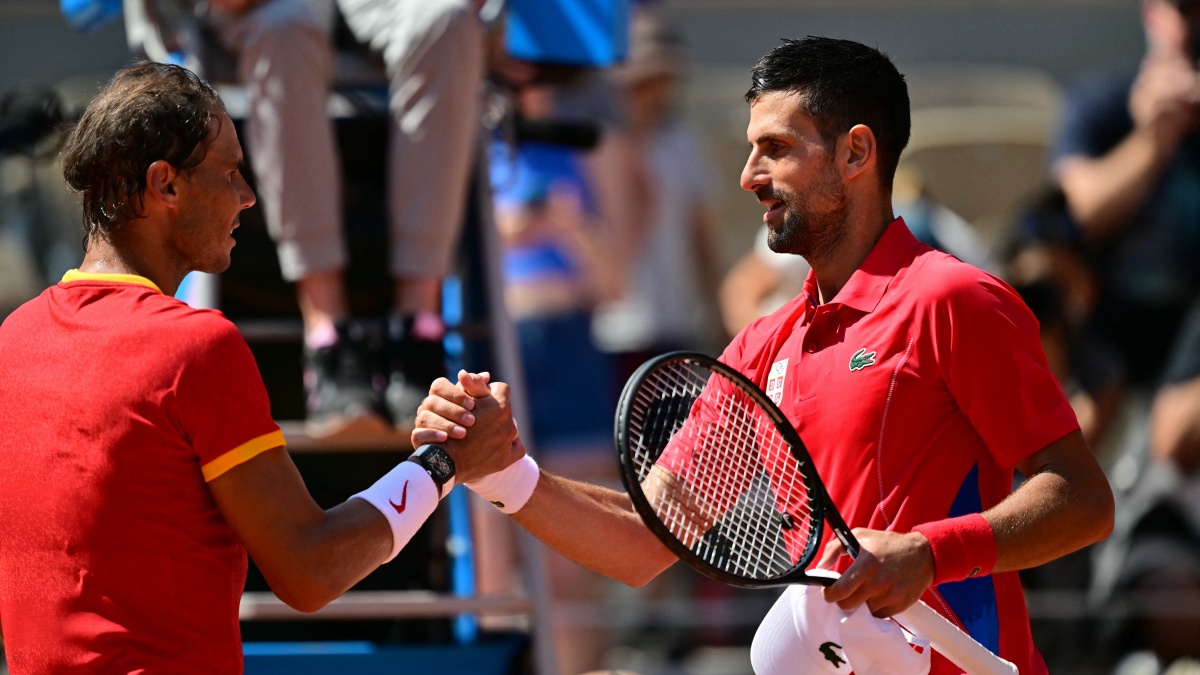There was plenty of appreciation of each other’s masterful shot-making. There were thumbs ups. There were palm-tapping of the racket strings. But in the end, it was a largely one sided 60th contest between Novak Djokovic and Rafael Nadal at Roland Garros in the second round of the Paris Olympics.
**Paris Olympics 2024: News, schedule, medals tally and more**Nadal produced multiple moments of his vintage self at the venue which houses a statue of him. There were clever flick of the wrists. There were breathtaking volleys. At one point Rafa leaped to a Djokovic smash to create an opening for a winner. But the moments were fleeting.
The 11th meeting between the two at Roland Garros was as one-sided as the 2015 French Open quarter-final. The Serb faced brief resistance as Nadal pocketed four games in a row in flashes of the past. All it did, though, was prolong the inevitable with the 24-time Grand Slam champion winning 6-1, 6-4 .
Was it the most one-sided win for Djokovic over Nadal? Not at all. At 2009 Cincinnati Masters, Nadal lost by the same margin. In Doha, in 2016, Nadal lost 6-1, 6-2. In the grand scheme of things and context of where Nadal’s career is, the outcome is not a surprise.
The Spaniard’s already waning powers on clay and more specifically on Court Philippe Chatrier have been there to see this year. It was going to be a test against Djokovic anyway. The test was exacerbated by the prospect of playing three days in a row.
Djokovic was in no mood to show any mercy. And for good reason. The Serb has suffered multiple heartbreaks at this very arena to Nadal, losing eight times. There’s the extra motivation of winning an Olympic gold medal - the only major honour that eludes him.
The 37-year-old ruthlessly made the most of Nadal’s movement with numerous drop shots - all delivered with devastating accuracy. Rafa chased a couple down but he was nowhere near to most of them. It is the same strategy that Alex de Minaur applied in Barcelona in April.
Hungary’s Marton Fucsovics had tried the same approach on Sunday, a no-brainer against a 38-year-old who has been struggling with injuries and playing with his thigh strapped. But where Fucsovics erred and allowed more air than needed, Djokovic was far more effective. He used it perfectly to arrest Nadal’s momentum of four straight games and seal a 5-4 advantage.
The story continues...
— ITF (@ITFTennis) July 29, 2024
1-1 in Olympic singles matches.
31-29 in all tour-level matches. #Paris2024 | #Olympics | #tennis | #viveletennis pic.twitter.com/cdBXTGd8rA
Beyond the drop shots, Djokovic, one of the best returners in the game, was helped by Nadal’s slowed down and error-prone serve. The Spaniard served two double faults, both in the middle of the net, and earned himself no freebies with 12 service winners compared to Novak’s 23. There were far too many soft serves, which came back with venom which took time away from him to get ready.
“During the first hour, the match was very difficult to digest because he was far superior to me, I was not able to generate the quality of the ball that I needed and he was playing very comfortably and when he plays like that with this comfort you are dead and he was also inspired,” Nadal said.
Nadal surges (briefly)
With the scoreboard reading 6-1, 4-0, Nadal was on the cusp of losing a bagel set to his Djokovic for the first time. At Roland Garros no less. Suddenly, out of absolutely nowhere, Nadal brought in his ’this-is-my-house’ energy that had been missing.
He held serve to make it 4-1 and the ignominy was avoided. Thousands in the stadiums breathed a sigh of relief. The crowd, as expected, cheered for the honorary Parisian who took part in the final passing of the Olympic torch at the opening ceremony.
Djokovic, utterly solid so far, played a horrible game, double-faulted on break point to reduce the deficit a game further.
Then at 4-3, Djokovic, dealing with scoreboard pressure and pegged back, was made to deal with drop shots from the other end. A turnaround looked possible when Djokovic cracked a smash into Nadal but the Spaniard quickly adjusted his feet and brought it back to set up an easy forehand winner to make it 4-4.
“I got maybe a little too comfortable there, played too sloppy a service game," said Djokovic later.
“You can’t give any chances to Nadal, he’s going to use them — he’s going to come back — especially on this court,” he added.
Just when it looked like a turn was coming, the Serb regained composure to break for a 5-4 lead. And forever the heel, he cupped his ear towards the crowd to take in the jeers.
Where does this leave Nadal for doubles and after?
Given how off pace Nadal looked and how depleted he must be after three straight days of matches, his chances in doubles - alongside Carlos Alcaraz - don’t look great.
As for what happens beyond the Olympics, it remains an uncertainty. He was asked whether it was the “last dance” indeed. “When this tournament is over, I will take the necessary decisions based on my feelings and sensations,” said the Spaniard.
He was equally agitated with the insistent questioning over his future. “I cannot spend every day thinking about whether it is the last or not, because otherwise it is impossible,” he said.
“I have been suffering a lot of injuries the last two years so if I feel that I am not competitive enough, or physically if I am not enough ready to keep going, I will stop and I will let you know,” he said.


)
)
)
)
)
)
)
)
)



